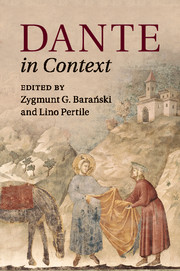Book contents
- Frontmatter
- Dedication
- Contents
- List of illustrations
- List of maps
- Notes on contributors
- Chronology
- Abbreviations and note on translations
- Introduction
- Part I Politics and society
- 1 Empire, Italy, and Florence
- 2 Economy
- 3 Law
- 4 Justice
- 5 Men and women
- 6 Church and orthodoxy
- 7 Heresy and dissidence
- 8 Daily life
- Part II Intellectual traditions
- Part III Linguistic and literary cultures
- Part IV Visual and performative culture
- Part V Dante: life, works, and reception
- Further reading
- Index
7 - Heresy and dissidence
from Part I - Politics and society
Published online by Cambridge University Press: 05 October 2015
- Frontmatter
- Dedication
- Contents
- List of illustrations
- List of maps
- Notes on contributors
- Chronology
- Abbreviations and note on translations
- Introduction
- Part I Politics and society
- 1 Empire, Italy, and Florence
- 2 Economy
- 3 Law
- 4 Justice
- 5 Men and women
- 6 Church and orthodoxy
- 7 Heresy and dissidence
- 8 Daily life
- Part II Intellectual traditions
- Part III Linguistic and literary cultures
- Part IV Visual and performative culture
- Part V Dante: life, works, and reception
- Further reading
- Index
Summary
Dante's age was notable both for the sheer variety of heresies and heterodoxies identified by contemporaries and for the vigour with which the institutional Church attacked them. By 1300 papal inquisitors, following established procedures and normally able to rely on substantial force, worked in collaboration with local bishops to enforce orthodoxy.
It was a struggle. The thirteenth century had been a period of spiritual and theological creativity. To recognize this much we need only look at the Dominicans and Franciscans. Both orders appeared early in the century and soon proved their value as a response to the needs of an expanding urban culture with a religiously enthusiastic, increasingly well-educated laity. Both orders also threw themselves into the world of scholastic thought and developed it rapidly. On both the institutional and intellectual levels, the new mendicant orders gave Europe a sense of direction as it negotiated an important period of western history; yet the nature and wisdom of that direction was open to serious debate. The new orders were seen as interlopers by a number of university masters and secular clergy; Dominicans and Franciscans often resented one another's presence; and, among the Franciscans themselves, factions differed as to what the order should be doing.
Such tensions might have been easier to deal with had they not interacted with a strong tendency on the part of the laity and lower clergy to develop new patterns of religious life. By 1300 Church leaders had long since decided it was necessary to rein in further novelty and contain exuberance within stable, controllable, orthodox channels. The mendicant orders were potentially useful for that purpose, and for more reasons than that they made excellent inquisitors (although they did). It seemed possible to limit dangerous experimentation by enticing pious Christians into existing religious structures tied especially to the Franciscans. But if the Franciscans themselves were at odds over who they were, that strategy could have its dangers.
In the dynamic religious world of the early fourteenth century it was often hard to decide precisely where the boundary lay between official and unofficial Church, or who should be identified as heterodox and who orthodox. There were, to be sure, old heresies that continued into the fourteenth century as unfinished business, Catharism and Waldensianism being the major examples.
- Type
- Chapter
- Information
- Dante in Context , pp. 106 - 118Publisher: Cambridge University PressPrint publication year: 2015
- 1
- Cited by



